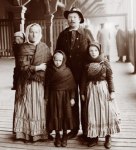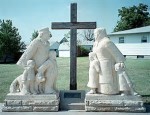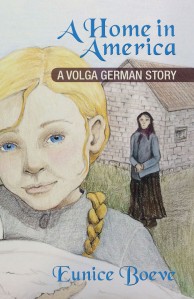 Back around 2012, when I first joined ‘Women Writing the West’, I somehow managed to start a correspondence with a fellow author in Kansas—Eunice Boeve. One might think that a romance author sitting in NYC and a predominantly YA and western author living out in KS had nothing in common, but Eunice and I have found a lot of common ground and continue our correspondence to this day.
Back around 2012, when I first joined ‘Women Writing the West’, I somehow managed to start a correspondence with a fellow author in Kansas—Eunice Boeve. One might think that a romance author sitting in NYC and a predominantly YA and western author living out in KS had nothing in common, but Eunice and I have found a lot of common ground and continue our correspondence to this day.
Eunice was born and raised in Northwest Montana and Idaho, the middle child of seven born to a storytelling father and a book loving mother. She writes historical fiction novels for adults and young people, and for the past seven years has written a chapter story for a program called Newspapers in Education, from which her latest book, A Home in America, has evolved. Her books have received a number of awards, including a Kansas Notable book award. She lives in a small Kansas town with her husband and an aging red dachshund.
You can find all her books on Amazon and Barnes & Noble and various other locations. Her website is: http://www.euniceboeve.net
Eunice has very kindly agreed to give away two copies of her book, A Home in America, to two people leaving a comment on this blog. And I’m pleased to announce the winners are Anne Schroeder and Colleen Donnelly. Our thanks to everyone who left a comment!
Thank you, Andrea, for hosting me on your blog this month.
The history of the Volga Germans gives testimony to what the human spirit can endure, for they came to Russia and against incredible odds built a life from

Volga Germans
literally nothing, but the ground under their feet. In 1763, Germany was in shambles, ravaged by seemingly unending wars and the demands of the ruling class, leaving the common citizen totally destitute. Then Catherine the Great of Russia offered land along the Volga River, free and clear with housing and horses and plows, and with no hope of a better life, they jumped at the Russian ruler’s seemingly spectacular offer.
But, when the first group arrived, there were no houses, no horses, and no plows. There was land, lots of land. But the nomadic tribes who had lived there for centuries considered it theirs. They swooped down on horseback, killing the men and capturing the women and children. With no place to go, no means to return to Germany and nothing there anyway, they stayed, and by sheer force of will, muscle, and faith, carved out a life on the Russian plains. That first winter, they dug caves for shelter with wagon boards for doors. These strong-willed people declined to interact with Russia in any way. They did not claim citizenship nor intermarry, but clung to their German language, customs, and religion as fiercely as they tamed the hostile land.
At first, they were promised freedom from the military, then Russia began to impose mandatory military service on males from sixteen to forty-five. With no feelings of loyalty to Russia, they felt no obligation to fight for the country, and many began to suspect that other demands would follow. With the idea of leaving Russia, they sent scouts to North and South America and these men brought back good reports of both countries, but favoring North America. Those who wished to immigrate and could manage the fares, left all they knew behind, sometimes even family members, and departed for the Americas.

Volga German Pioneer Memorial, Victoria, KS
Of those who did immigrate to America, many came to Kansas. Others settled in other states, including North Dakota, and Nebraska. For the most part, they kept together creating their own small towns. Those small towns around Hays, Kansas were given the names of the villages they left behind in Russia, like Herzog, Liebenthal. Pfeifer, Schoenchen, and Munjor, and, with the exception of Herzog, are still in existence today. Herzog is now Victoria. Settled by the English when the English left, the two towns became one. The fact that America is made up of a very diverse population, and English is the main language, made it almost impossible to exist in isolation as the entire Volga River Germans did for some one hundred plus years in Russia. So even the Volga German so steadfast in remaining German, began to mix with others, as have many other ethnic groups who came to this land we call America.
A Home in America, Book cover by Julie Peterson-Shea, published by Rowe Publishing and available at http://rowepub.com/a-home-in-america/ and http://www.amazon.com/Home-America-Volga-German-Story/dp/1939054818/
 A Home in America begins in the year of 1892, with Eva and her family living in the Volga River area of Russia settled by their forefathers from Germany in the mid 1760s. They have always considered themselves to be German and have kept their language and traditions, as promised them, along with being exempt from military service, when they settled this part of Russia. But 130 years later, Russia is disregarding those earlier promises and many, including Eva’s family believe they would be better off in America. Going to America, though, means leaving Great Grandmother behind. Great Grandmother, now old and blind, has been the only mother Eva has ever known, her own mother dying the day she was born. Father has remarried, but although she likes her stepmother very much, it is Great Grandmother whom she still considers her mother and she cannot bear even the thought of leaving this woman she has loved like a mother all her life.
A Home in America begins in the year of 1892, with Eva and her family living in the Volga River area of Russia settled by their forefathers from Germany in the mid 1760s. They have always considered themselves to be German and have kept their language and traditions, as promised them, along with being exempt from military service, when they settled this part of Russia. But 130 years later, Russia is disregarding those earlier promises and many, including Eva’s family believe they would be better off in America. Going to America, though, means leaving Great Grandmother behind. Great Grandmother, now old and blind, has been the only mother Eva has ever known, her own mother dying the day she was born. Father has remarried, but although she likes her stepmother very much, it is Great Grandmother whom she still considers her mother and she cannot bear even the thought of leaving this woman she has loved like a mother all her life.
This story began as a Newspaper in Education story and was featured in five Kansas newspapers for 8 weeks beginning Jan. 5, 2016, and told of their journey to America. The rest of the story chronicles their next year when they settle on a farm near Herzog (Victoria), Kansas.
Excerpt
“After much thought and prayer,” Father says, “Great-Grandmother, Leah, and myself have decided it would be best for our family to leave Russia.” He pauses, then adds, “So next spring we will leave for America.”
I am so surprised, so shocked I think I could be knocked off this bench with a feather. Beside me, Great Grandmother bends her head in prayer and her fingers begin traveling the beads of her rosary, her lips moving in silent supplication. Fear clutches my heart as I realize how old, how feeble she has become. Will we leave her here, like Mia’s family will leave her grandmother?
I raise my eyes from Great Grandmother’s bent head and the rosary in her hands, to see if Father has noticed my fear and will reassure me with a smile, but he is busy answering Peter and Michael’s excited questions. Then I’m remembering this morning at the cow shed and how Leah had remained silent when I said I was glad we weren’t going to America and with a small jolt of anger, I turn to her.
Her brown eyes meet mine and they seem to ask for forgiveness, but I feel no forgiveness. She could have at least warned me! I close my face into a tight mask and blink back my tears and hold on to my angry thoughts so they do not become words. I know that Great-Grandmother cannot make such a long trip and I also know I cannot leave her. Then Great-Grandmother’s hand finds mine and my anger at Leah dissolves and I realize those words were not hers to tell, but Father’s.
A coldness settles over me as I listen to Father tell of the rumors growing stronger every day; rumors of Russia headed for war with Japan. And if they go to war, men and boys sixteen to forty-five will be called to fight for the Russian army. Peter will turn sixteen next summer, Father, who is forty, will have to go immediately. Michael at thirteen, nearly fourteen, is safe, but for how long? Wars can last for years.
Father says it was those same rumors of war that sent Uncle Johann and his family, to America and that we would have gone with them, but for Great-Grandmother. At his words, my anger, cooled, again rises up in me. Does Father think she can go with us now, even though she is now blind, and five years older?
















Dear Andi and Eunie, This is such a fabulous history and story and I tank you for educating me on a pioneer group I’d never come across. The story of the Volga Germans has me admiring their pluck for remaining in Russia after so many broken promises, sticking there for over a century and then coming to America. We are truly a nation of immigrants full of rich stories!
Arletta
LikeLike
It is fascinating, Arletta. I believe Michener touched on the Volga Germans in his book, ‘Centennial’ but aside from that, I’ve read nothing ’til Eunie brought this out. There were so many English colonies about which I’ve read, but not Germans.
LikeLiked by 1 person
Oops, I read “Centennial” but a fifty year lapse of memory didn’t serve me well! Nor did spellcheck, just today! THANKS
LikeLike
It sounds like an awesome book, rich in history and feelings. Loved the excerpt, reads like a rich, personal history of a people who didn’t let anything stop them from surviving and thriving.
LikeLike
Absolutely, and it is especially pertinent in that way at this time.
LikeLike
Great excerpt, Eunie! I never knew of the Volga Germans before. Their move to an inhospitable land must have forged a strong character–traits which would help them prepare for their new lives as settlers in America. Amazing the hardship people are able to endure. Thanks for sharing.
LikeLike
An endless search for a better life, it would seem. To us, moving from Germany to Russia may not be so wrenching, but from the Russian steppes to Kansas is quite a move!
LikeLike
It is amazing what hardships people are willing to endure to get to a better country. Once in Colombia I met a taxi driver who had come to the states in the hold of a ship as a stowaway with nothing more than a bottle of water and a banana. He was here for twenty-one years before going back.
LikeLike
I have a Volga German son-in-law whose great, great grandparents on both his mother and father’s side came to Kansas from Russia. He and my daughter and their two girls live on a parcel of the land first settled by his mother’s great grandparents. I had no idea the rich heritage of the Volga Germans until I began my research for this book. Arletta, I’d read Centennial so long ago, I’d forgotten, too, but Andrea reminded me. And to hebbyroman, thanks for your kind words.
LikeLike
My uncle, Glenn Mueller, compiled extensive research on the Klein family who immigrated from Dreispitz. He left his material with AHSGR in Lincoln, NE. and GRHS in Bismark, ND. Both of these foundations provide great information on this subject in history. One of his articles, The Trek of 1921-1922,was printed in a AHSGR journal. Because I’m familiar with Glenn’s material, I was drawn into Eunice’s story after reading a reduced format in The Salina Journal. Eunice accurately described the trials the Volga Germans experienced from the Russian government, and my uncle would find her novel historically worthy. Eva Maria, the 12 year old narrator of A Home in America, compellingly draws the reader in with her fears of ‘the unknown’ found in a new country, and the fears of ‘losing her past’ by leaving her home. Thanks for remembering our Volga Germans. Barb Mueller Lehmann
LikeLike
Barb, what a lovely addition to the conversation; thanks so much. And if you haven’t already, your final words would make a great review of Eunie’s book on Amazon! 😉
LikeLike
Thanks Barb for your input to this story. Your uncle’s research work in Lincoln and Bismark will be a treasurer trove for those researching the Volga Germans. I would love to read your uncle’s article. I’m a descendant of a Klein who lived in France and migrated to Germany, but wasn’t a Volga German. Those Kleins became Cline when they moved to America. A big thank you for allowing me to use your words on the ‘A Home in America’ book cover.
LikeLike
What a fascinating history, Eunie, and thank you Andi, for hosting her. I have mostly German background, but had never heard of the Volga Germans. Now that I have read the book, I know even more, and highly recommend it!
LikeLike
Glad tp hear Eunie has enlightened you. Thanks for letting us know.
LikeLike
Fascinating story. .having come from German heritage in Iowa, I always enjoy reading about their lives
LikeLike
Thanks for stopping by.
LikeLike
Thanks Julie and Dawn, I appreciate your comments.
LikeLike
Being of German decent, I’d never heard of Volga Germans before. Thank you for this information. What a super storyline, Eunice. Thank you Andi for featuring Eunice and this history and her writing. I can’t wait to share this with my parents.
LikeLike
You’re very welcome Carmen. I find it fascinating that this very specific sect of Germans made their way first to Russia and many years later on to Kansas and other spots in the US. It certainly is a very little known piece of American history.
LikeLike
This would be a book I would ready with my 10-year-old granddaughter. The themes of family, strength and adversity are topics we discuss when we are together. We are from an Amish background and have much in common, I suspect. Thank you for writing this.
LikeLike
Anne, I have to say I’m surprised you have not used your Amish background as material for a book. They are such a fascinating sect with such stringent laws that are so difficult to follow in our modern times. I made sure to make Lancaster, PA, the center of several Amish towns, a first stop on my cross-country road trip with my daughter 2 years ago.
LikeLike
Fascinating information. What courage and determination they showed. I was lucky enough to visit Victoria (Herzog) in Kansas a few years ago. Wonderful history!!
LikeLike
Barb, I’m wondering if you, too, intend on using these people as material for a book. I’m very sorry now that I missed Victoria on my drive through KS a couple of years back, but I guess one can’t include everything.
LikeLike
You couldn’t have convinced me history was fascinating in school, but it sure Is! I’m a Kansan and you have enlightened me about my own state’s history. Fascinating, and thank You!
LikeLike
I can imagine how you feel somewhat. I always thought of Kansas in terms of the cow towns–Dodge, Abilene, Wichita and the like. Eunie has enlightened me to what a varied state it really is, what with Victoria and Herzog, Nicodemus and Concordia with its Orphan Train Museum, and so on. Lucky you for having so much history on your doorstep.
LikeLike
I’ve known Eunie for a long time! She has never failed to entertain through conversations or her books! Keep on writing , friend!
LikeLike
I’ll second that!
LikeLike
Thanks to all of you for your comments. I am amazed at how many people, even here in my little home town, who have made it a point to let me know that they are of Volga German descent. Even just this morning, my minister shared that one of his great grandfathers was a Volga German.
LikeLike
This sounds like a very interesting story, I was unaware of the history of the Volga Germans can’t wait to learn more!
LikeLike
It is very interesting. Laura. thanks for stopping by.
LikeLike
I am looking forward to reading Eunie’s new book. I know nothing about the subject yet, but I know I can trust her research to be accurate and enlightening. All of the earlier books that I have read have been quite delightful. Thanks for sharing this on your page, Andrea.
LikeLike
I keep saying her books should be compulsory on all KS schools reading lists. I’m very glad to have shared her work.
LikeLike
Thank you Laura and Norma. I appreciate your comments.
LikeLike
I recently finished reading “Russian-German Settlements in the United States” by Richard Sallet. I first browsed through a copy of it at the library that is maintained by the West Valley Genealogical Society in Surprise, Arizona. I am a member and have spent numerous hours at that library because, alas, it is not a lending library. My own heritage is German and my grandparents too emigrated, but to Minnesota to avoid conscription in the German Army as WWI began. I have used my research to enrich a family saga I am writing and am most interested in securing a copy of your book. Thank you for an inspiring summary.
LikeLike
To “Jagrout,” How very interesting. Thank you for stopping by and leaving a comment. Good luck with your family saga. Speaking of luck, I’ve had a bit of bad luck with my book as I’ve just recently discovered there are editing errors and am working now to correct them. I hope it won’t take too long. When the corrections are made, I will get your e-mail from Andrea’s blog and let you know when the book has been corrected.
LikeLike
This sounds like a wonderful story, Eunce. My family is also of German origin, although they came from Bukavina and Galacia, which are now part of Romania and Ukraine. But like the Volga Russians, they maintained their German language and culture in the old country. Germans from this area immigrated to a number of places in North and South America, but primarily to Saskatchewan in Canada for the free land the government was offering.
LikeLike
Interesting Jana. I did not know there were other German people who moved from Germany to nearby countries, probably for the same reason the Volga Germans did–the common people made destitute by the ruling class. I wonder if they immigrated to the Americas and Canada for the same reason–their host countries beginning to make demands, among them serving in their armies. Thanks for your comment.
LikeLike